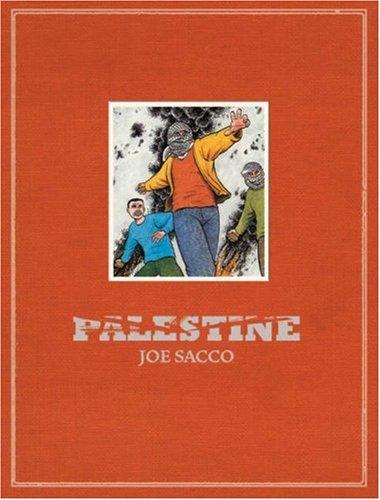Review of 'Palestine' on 'Goodreads'
3 stars
This review is crossposted from my blog here: daariga.wordpress.com/2017/02/12/palestine/
I can distinctly remember the time of my childhood from when I started to hear about the part of the world called Palestine. For many years, it was just the image of Yasser Arafat in his distinctive outfit and news about some peace talks and Nobel peace prizes. And when I started to be exposed to more US news channels like CNN and Hollywood movies, I started to hear about Israel and a succession of US presidents wanting to bring peace to the region. Essentially, it looked to me that these folks were unluckily caught in a shitty situation and they were screwed, possibly forever. This weekend, as I turned the pages through Joe Sacco’s highly acclaimed comics about his journey in Palestine, I realized my guess was right.
Palestine cannot be called a graphic novel, cause it is …
This review is crossposted from my blog here: daariga.wordpress.com/2017/02/12/palestine/
I can distinctly remember the time of my childhood from when I started to hear about the part of the world called Palestine. For many years, it was just the image of Yasser Arafat in his distinctive outfit and news about some peace talks and Nobel peace prizes. And when I started to be exposed to more US news channels like CNN and Hollywood movies, I started to hear about Israel and a succession of US presidents wanting to bring peace to the region. Essentially, it looked to me that these folks were unluckily caught in a shitty situation and they were screwed, possibly forever. This weekend, as I turned the pages through Joe Sacco’s highly acclaimed comics about his journey in Palestine, I realized my guess was right.
Palestine cannot be called a graphic novel, cause it is not fiction. It is the journal of 2 months in 1991-92 that Joe Sacco spent in the region, presented as a comic. Sacco, a US journalist, did a whirlwind tour of Jerusalem and the two Occupied Territories of West Bank and the tiny Gaza Strip. He travels around a lot in the region and visits many of the conflicted regions we keep hearing in the news like Ramallah, Gaza town and Rafah. He visits the biggest refugee camps, talks to people affected by the occupying Israeli forces. The comics give us a visual journey, the depraved conditions of the Arabs, the squalor of the refugee camps and the constant presence of the Israeli forces.
As you read through the pitiful tales of the affected people, the depressing tales start to all sound familiar and repeated. It is always goes like this. Sacco shows up in a new town or refugee camp. He befriends a taxi driver or a seller at the market or an educated fellow. He asks around and says he wants to visit the family of someone who was recently affected by Israeli settlers or police. He is taken to one such home. He is surrounded by the male folks of the family and friends and over cups of extremely sweet tea, always tea and more tea, their pour out their story of suffering. A son, a brother, a father, someone gets into a skirmish with a settler or police. Or he is suspected of being aligned with one of the four Arab factions like Fateh and is picked up. He is imprisoned for weeks or months or years without seeing a court in one of the horrid prison camps. Or he is tortured, what Israelis called moderate pressure, and wounded or killed after that. One such torture killing led to the Intifada in 1987 and since then the Israelis have been careful to impose constant curfews and drop off the dead to their families in the middle of the night for a quick and quiet burial under the watch of their Uzis. And on and on it goes, these tales of woe. Young men having grown up under the constant glare of Israeli watch towers and barb wire see no future for themselves other than joining up one of the four Islamic factions that reap the youth for their own benefit. They spend their lives glaring down Israeili forces, throwing stones at their jeeps, an occasional killing of an Israeli settler, followed by retaliation by the Israelis, leading to more bile and on and on. Like I said before, I see no hope.
This book has a moving introduction by Edward Said that should not be missed. The comic itself is beautifully drawn. Especially the sad faces of the men, mothers and children will stick in my mind for a long time. We get to vividly experience what people in the West Bank and Gaza are or were enduring in 1991 on a daily basis. We get to hear the Israeli side of the argument in the last of the 8 chapters. Interspersed in between the stories of the Palestine victims we also get to learn small bits about the history of Israel and Palestine and how this land ended up in so much contention. While I have no doubt in saying this is a good book, it again falls victim to a crime I repeatedly witness US authors commit: giving the reader every last numbing bit of his or her experience in a foreign country. Instead of using a few representative refugee stories and experiences, Sacco hammers us with every single person and every single story and every single experience he had in 2 months. While this might have been digestible in the 8 separate volumes this was initially published as, it is unbearable in the combined book it is published now as. Other than this one nitpick, Palestine is a good book about the plight of a people under the longest military occupation in modern history.

